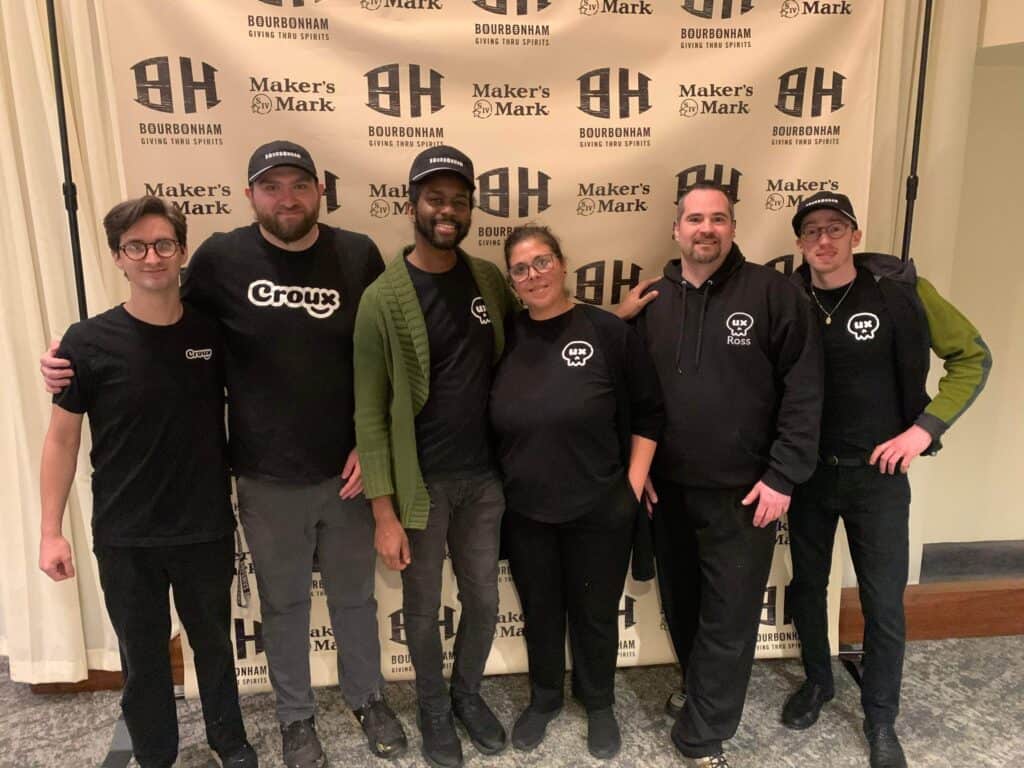
August 11, 2025
GREEN BAY – Amid industry-wide staffing challenges, Jennifer Ryan said the will to work in hospitality is alive and well, but the right technology must be leveraged to connect talent to the right crew – Croux, in this case.
Ryan – CEO/co-founder – said Croux (pronounced “crew”) is “a platform that connects everyday Americans with opportunities to earn flexibly,” while also ensuring “the invisible workforce that powers most of this country – blue-collar, behind-the-scenes work – gets done.”
“We did not birth this concept by any means,” she said, citing other flexible earning companies like Uber and Lyft. “But what we weren’t seeing [available] was something applicable to our industry in small towns across America, catering to a population of workers we knew very well, and we understood what they wanted.”
Ryan said Croux was founded in 2021 in Alabama after she and several peers in the restaurant industry were driven to overcome staffing shortages in the aftermath of the COVID-19 pandemic.
“Any hospitality person will tell you there’s typically a text [message] thread with 50-100 people on it where somebody’s saying, ‘Is anybody available to work?’” she said. “[With Croux], we turned that text thread into a product that tried to connect those two sides: people looking for work and more flexibility, with people who needed workers. That was the very beginning.”
Not long after her family relocated to Green Bay, Ryan said Croux received an investment from TitletownTech (in 2023) and has continued to expand and refine the platform since.
Now, she said Croux is being utilized throughout Green Bay – where Croux talent helped make the 2025 NFL Draft a success – as well as Appleton, Oshkosh and Kohler.
Including its established markets in Northeast Wisconsin, as well as in Alabama (its headquarters of Birmingham, as well as Auburn, Huntsville, Mobile and Tuscaloosa), Ryan said Croux currently has more than 30,000 workers and 100 businesses utilizing the service, with an eye on expansion.
“We’re in the middle of the country in places we believe are really important to the state’s economic health, but also to the fabric of America,” she said. “I’m from the West Coast [and] lived in New York for a long time. I love those places, but those places often get a lot of resources and a lot of support. So, we’re really excited about the heartland of America and making sure we’re doing what we can to fuel those local economies.”
Takes Croux to tango
Ryan said Croux is a marketplace that “brings together two sides that have a hard time finding each other” – talent/workers and businesses.
“Practically speaking, we have an app that our talent can download for free and start to access shifts in their area,” she said. “Those shifts are posted and promoted by the business partners that are in town.”
The talent, she said, must be 18 or older, cleared to work in the U.S. – “which means you might have a social security number or a visa” – and pass a background check – “just looking for big things and making sure any flags that come up are clear.”
Ryan said that process can be completed within 24 hours of downloading and filling out the application.
There’s no such thing as typical talent at Croux, Ryan said – however, 70% of its talent happens to be women.
“Some of them may have worked before and… are looking for a way to get back in [the workforce],” she said. “Some are currently working, but the current paycheck doesn’t really clear the economic hurdles their families are facing. Some are in a position whereby they can’t out-earn the babysitter, because childcare costs continue to go up in our country.”
Ryan said Croux utilizes AI to “intentionally bypass discrimination and bias.”
“I’m looking to understand which person is best for a role, not based on your gender, race, ZIP code, age, name – any of those identifying factors [go] out the window,” she said.
Other archetypes of Croux talent, Ryan said, include military spouses who can’t commit to a long-term position; people coming out of retirement due to inflationary pressures or craving social interaction; and college students looking to offset student loans.
“The hope,” she said, “is to keep that net really wide.”
The platform also accepts a wide range of experience, though Ryan said she sees a trend toward talent having a background in hospitality.
“It’s not a prerequisite, but we seem to attract folks who either work in the [hospitality] industry or used to,” she said. “And ‘used to’ could mean you bartended for one summer in college – it just means you sort of understand the industry. But, I do have a lot of people who have never worked in the industry.”

As different as individual workers, their motivations and their curricula vitae may be, Ryan said talent are commonly seeking flexibility, variation, quick compensation and transparency.
Trust, she said, is naturally sought by both talent and businesses.
For the latter, Ryan said Croux has established a Trust Score system to vouch for talent’s viability, and, per croux.co, increase “visibility and likelihood of being selected for future opportunities.”
“The [talent] who find Croux to be a successful venture are the folks who can do the things they can control: show up, on time, in uniform, have a good attitude – and that is what powers the Trust Score,” she said.
According to the website, factors which boost one’s Trust Score include professionalism, fast learning and a sense of urgency, whereas detriments include frequent and/or late shift cancellations, poor performance and deceit.
Intentional manipulation or circumvention of Croux’s timekeeping system (for tracking shifts worked), the website states, results in permanent suspension from the platform.
Ryan said the industry is “built on trust” – which extends to talent, Croux itself and the businesses that use it for staffing solutions.
“Could be a hotel, convention center, a stadium, a wedding venue, a restaurant or a bar,” she said of ideal businesses. “Typically, we see those folks in high-volume hospitality. The folks who need a lot of people to make the magic happen are really in need of support bodies.”
Businesses considering Croux for staffing, Ryan said, can complete the contact form on the website.
“Fifteen minutes of your time allows us to create a profile for you getting locked and loaded, and to give you the keys to providing or connecting with a flexible workforce when you need it,” she said.
Further underscoring the value of trust, Ryan said businesses’ subscriptions and transaction fees are the sources of Croux’s revenue – only “if we do our jobs.”
“That’s the most important thing: I only want to get paid if we do what we promised we would do,” she said.
The overall process, Ryan said, is one the Croux team has made as seamless as possible for businesses and talent.
Third-party resources, she said, are leveraged to provide employee background checks, payment processing and health and wellness benefits.
Regarding the latter, Ryan said by working one shift per month with Croux, talent has access to “free and low-cost health and wellness benefits for you and your family.”
Per the website, the Croux Cares program includes “complimentary life and AD&D insurance, counseling services and prescription discounts,” and options for additional coverage and support “for just $1 per week each.”
After utilizing third parties to offer Croux’s flexibility and quick payment system, Ryan said the next objective was health and wellness benefits.
All the effort, she said, has been aimed at connecting willing talent with short-staffed businesses.
“For talent, generally speaking, there is no downside to testing Croux, seeing what’s out there, and if this works for you – there’s no risk,” she said. “For our business partners, we stand by our guarantee of exceptional service and a deep commitment.”
Creating Croux
Her story leading up to Croux, Ryan laughed, is “not really a hero’s journey by any means.”
Hailing from a small town in southern California, she said her father instilled in her the importance of financial independence after college.
Ryan said this wisdom, coupled with her desire to live in New York City, led to a 10-year career with Goldman Sachs.
“It was exceptional training, people and experiences, and it taught me just as much from a ‘hard skills’ training perspective as it did from a ‘how to think on your feet, respond to clients, serve people, problem-solve’ [perspective],” she said.
With this foundation, Ryan said she decided to reorient her career based on “where the world is going” – technology.
When her husband was transferred to Birmingham, Alabama, she said she began to work remotely in the tech industry – another “incredible” experience, which included taking the company public.
“It was a lot of learning – [such is] start-up world – as [I went] from really big to smaller and much more nimble,” she said of the career change. “And then I found myself running a restaurant in Birmingham.”
Ryan said she founded a “salad, burger and bowl restaurant – fast-casual, healthy food, with a James Beard Award-winning chef” in 2019.
“After proof of a year of good revenue and solid customer experience, I had established an SBA loan and had that confirmed,” she said. “It came through Feb. 20, 2020, so the timing was not that great.”
Within weeks, Alabama businesses would be impacted by COVID-19, as Ryan said her restaurant survived the following year on “bubblegum, duct tape, prayers” and creativity, as she and her team “started slinging salads out of a little makeshift situation.”
“A year later, we broke ground on our flagship – the SBA loan fueled that growth,” she said. “In May, I had a baby, and in June, we opened… That wild twist of [me] turning into a hospitality operator is really the preamble to Croux.”
By October 2021, Ryan said “the Great Resignation was upon us,” as staffing shortages ensued.
To formalize and grow connections for local hospitality work, she said Croux was co-founded by five people with careers spanning “from catering to food distribution, to operating more than 50 units of a national brand, a small business operator, like me, and a software engineer.”
“There were a few of us looking for better ways to operate than just accepting what was in that moment, which felt dire, difficult, completely untenable – but it didn’t seem like there were a lot of options,” she said. “We had been brought together by one of our co-founders in the spirit of brainstorming better ways for us to support the people working for us, while trying to keep our lights on.”
A “hackathon” event hosted by the mayor of Birmingham, Ryan said, not only gave her and her fellow co-founders an opportunity to better develop the yet-unnamed Croux, but the platform wound up winning the top prize.
“That wild experience provided a little bit of seed capital, mentorship, but also the mental momentum – maybe there was something [promising to this concept],” she said. “So, we cemented the name and the team, and then by Q1 of 2022, we decided we would actually start building this thing.”
The name of Croux, Ryan said, came from one of the co-founders, embodying a sense of teamwork (“join the crew”) and a nod to the restaurant industry that inspired the concept, incorporating “roux” – a chef-favorite thickening agent for soups and sauces.
After working to build up the then-“rudimentary” technology of Croux and growing it across Alabama, she said in 2023, her husband was once again relocated for work – this time to Green Bay.
On a pre-move visit to better get to know the city, Ryan said she happened to meet representatives from TitletownTech.
“That wonderful introduction – that was meant to be a casual introduction, a benign introduction – turned into a deeper conversation on Croux, [which] turned into a board presentation to the decision makers, [which] turned into an investment, and that investment was cemented when we moved up here,” she said. “It was unbelievably well timed to have the support of the community as we ourselves, as outsiders, came into Green Bay.”
Ryan said as Croux continues to prosper throughout Alabama, she hopes for similar expansion in her now-home state.
“Birmingham is our headquarters – our hub – and we’ve expanded our reach to support big and small businesses across that state,” she said. “We hope to do the same in Wisconsin.”
Staffing the draft
When the NFL announced in 2023 that Green Bay would host its annual draft event in 2025, Ryan – though still new to the city at the time – said she recognized this as a time for Croux to shine.
“We have deep experience supporting and staffing large-scale events: SEC gamedays, PGA golf tournaments, NASCAR races – this is what we do,” she said.
Instead of jumping into preparation for Green Bay in 2025, Ryan said Croux began making contacts with Detroit, which was set to host the draft in 2024, and ended up providing talent for that event to gain experience for Green Bay this year.
“It was a very intentional move to make sure we could roll up our sleeves and execute and do [the draft in Green Bay], and that we understood what that landscape looked like, because a draft’s a little bit different from some other big events,” she said.
Ryan said Detroit proved to be a positive experience, which Croux was able to apply toward more “magic” staffing for Green Bay around the Titletown District.
She said she likens Croux talent to “quiet jet fuel in the engine” – a workforce responsible for “making sure the pieces come together.”

“You wouldn’t have seen Croux independently [during the draft],” she said. “Croux would have been an invisible part, but an important part, of the fabric of what was going on behind the scenes.”
Croux’s future
Invoking Marc Andreesen, Ryan said the first few years have been marked by a mix of “terror and euphoria” often familiar to start-up founders.
“It has been a wild ride,” she said. “The terror always comes from the responsibility we carry as founders – for that talent of 30,000, for our business partners – and I think that’s what allows us to continue to be alive and successful.”
The euphoria, Ryan said, has come not only from the competitions Croux has won or the encouraging investments it’s received, but “in most of the small moments.”
“The feedback you get from talent [is] that we’ve changed their lives by giving them access to immediate pay, to pay a bill, [with] work they weren’t able to get before [using Croux],” she said of examples. “[From] women who had an opportunity to [join] the workforce when they didn’t think they had an avenue to do that – those [stories] will never stop making your heart smile.”
Describing the project as “extraordinary,” Ryan said she’s working to not only expand Croux into new locations, but also into new industries.
“The theme of fueling local economies doesn’t stop with hospitality,” she said. “We know there are other industries that have been decimated, from a staffing perspective, that are in deep need.”
Manufacturing, Ryan said, is one such industry that figures prominently in both Wisconsin’s and Alabama’s economies.
“[By] starting with hospitality and then expanding, the dual impact, or the byproduct, is that our talent has more opportunities to earn,” she said.
Construction, agriculture and light industrial work, Ryan said, are other potential candidates for Croux to staff.
She said “the door’s open” when it comes to companies reaching out for solutions.
“For our business partners out there, or those who have not yet used Croux, we are here to support and serve,” she said.
Locally, particularly as the Green Bay Packers’ season nears, Ryan said she hopes Northeast Wisconsin businesses will consider Croux.
The same goes for talent, she said, who, “based on their experience, availability, role preference, resume or maybe just their driving distance,” can start to earn additional income, consistently within just 48 hours of downloading the app.
“At the end of the day, our hope is to be a credible and trusted partner to our business partners and the source of opportunity for working-class Americans around the heartland,” she said. “Now we just have to continue to build, one day at a time.”
 ‘A couple of waitresses reopened a legend’
‘A couple of waitresses reopened a legend’ Feeding customers in a relaxed setting for 90 years
Feeding customers in a relaxed setting for 90 years








